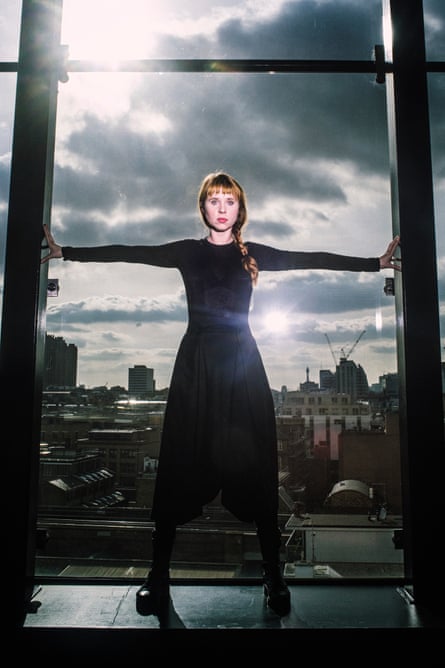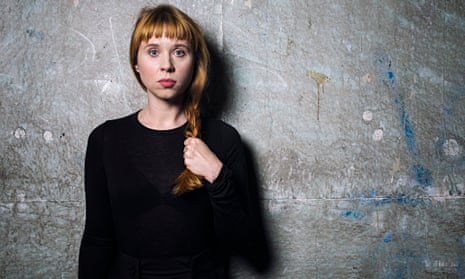Which musical instrument conveys the most emotion? Piano, cello, guitar? For Holly Herndon, whose ultra-contemporary compositions reflect on everything from targeted advertising to betrayal by the NSA, it’s the laptop.
The Guardian’s product and service reviews are independent and are in no way influenced by any advertiser or commercial initiative. We will earn a commission from the retailer if you buy something through an affiliate link. Learn more.
“A lot of people complain about it being less engaging, less natural, less emotional, but my laptop mediates so much of my life: my Skype, my bank account, my emails, my relationships,” she says. “It’s actually a hyper-emotional instrument; it has more emotional content than a violin could ever dream of.”
Long associated with desiccated performances by blokes in ill-fitting black T-shirts, the laptop instead allows Herndon to fully evoke our smartphone-addicted modern life. “I’m interested in what it sounds like to be making music in 2015,” she says. “How do we express the emotions we’re feeling today? I find it odd to use a violin swell from another era to discuss the feeling I have after a Skype breakup.” Her tracks sound like techno recovered from a water-damaged hard drive.
Born in Tennessee and now living in San Francisco, she first gained wide notice with her 2012 album Movement, where vocal-led dance tracks were buffeted off course by weird sighs, breaths and mumbles; she’s since signed to 4AD, home to American indie royalty like Bon Iver, Grimes and the National. As her star has ascended, she’s been studying a PhD as a composer at Stanford University’s Center for Computer Research in Music and Acoustics, where “you have a lot of highly achieving creating nerds who are just given the freedom and resources to do whatever they want”.
Which puts Herndon in the same techno-utopian tradition as Apple’s Steve Wozniak or “singularity” researcher Ray Kurzweil – innovators who see machines as helping people connect with one another and lead more spiritually rich lives. One track on her new album Platform aims to induce autonomous sensory meridian response (ASMR), a phenomenon where people derive pleasurable tingling sensations from certain sounds – in this case, a woman whispering. A search on YouTube brings up hundreds more examples, with recordings of everything from fondled cellophane to raked sand and collapsing Jenga blocks.

“The ASMR community goes against that mainstream assertion that the internet is making everybody less connected, and hurting relationships,” Herndon says. “People are making these videos at their desks, putting them online for free, and comforting strangers in this really therapeutic and sweet way.” Her own ASMR trigger is the sound of acrylic fingernails tapping on a smartphone screen. “I just want to hear that, and it drives me crazy!” Elbows in, palms out, she’s a bundle of gestures, and a stark trio of colours: blue eyes, copper hair, and the black techno uniform of asymmetrically draped clothing.
Platform is so named because Herndon wants it to be a platform for the various collaborators on the record: ASMR fanatic Claire Tolan, deadpan Twitter humorist Spencer Longo, and others. “Being a lone genius is definitely more marketable, but I don’t think art works in that way,” she says. Another track, Chorus, uses a piece of software made by her artist husband Mat Dryhurst to monitor the sound from the web pages she visits, which is then recomposed for the bedrock of the track – a sly riff on the obsession with self-monitoring in the age of the Fitbit.
Herndon contrasts the collaboration she’s striving towards with 1990s utopian punks Fugazi, who shouted their vision of equal society down from a stage. “I think that’s cool, and they did a great job at that time, but that doesn’t feel like it would work now. It can come across as one-directional, and I’m looking at how performance can be less one-directional.” She twists sheepishly. “I haven’t figured that out at all. And my album falls under my name, so I’m slightly hypocritical, but that’s something I’m trying to navigate.”
Herndon is part of the Tumblr-scrolling generation that grew up with the web, resulting in this wide cast of characters and reference points. Our conversation skips from design strategist Benedict Singleton to drag queen rapper Mykki Blanco, art theorist Suhail Malik to the positively Brass Eye notion of i-Dosing: where teenagers use immersive 3D sound to try to get high. She even considers the ridiculous bouffant of Kasabian guitarist Serge Pizzorno: “What’s this about?” she laughs. “It seems to only exist on this island.”
And if Platform is a model for communality, then so is the nightclub. She was schooled in techno via a spell living in Berlin, and clubs are often where she plays live (even if tracks of women whispering don’t exactly invite CO2 cannons). “The club has had a liberating role, historically – if you look at gay clubs in Chicago, you could see them as escapist, but really people were designing an alternative paradise.” But, she says, the way things stand, that ideal doesn’t match a reality where woman are groped, and the music can be moodily macho. “I don’t see it now as a place to tease out new progressive ideas. And it’s a lost opportunity. Cynicism, sarcasm, mockery – it isn’t taking us anywhere. It’s a depressed response to the oppressive conditions under which we’re all living: this precarious position where we don’t know if we’re going to own a house, we don’t know if our jobs are going to end, where everything sucks.”
Violating my inbox felt [worse] than if someone went into my apartment. That's where all my relationships live
Her optimism was further undermined by the NSA revelations, inspiring her track Home, which she’s described as a “breakup” record – a lament for the devices she can no longer trust. She says that while on tour, “my inbox felt like home. And then to think about someone violating that space...” She looks a bit sick. “It felt like even more of a violation than if someone went into my apartment, because it’s just my socks. There’s nothing that personal there. But if someone’s in my device, that’s my home, that’s where all my relationships live.” She’s not about to disconnect and live in a yurt, however. “It’s a breakup song, but not really – it’s more ‘it’s complicated’. I still feel emancipated by technology.”
At 35, Herndon is as politically astute as she is aesthetically daring – plugged in to a network of ideas for how to push our lives uphill. She cites the British economist Guy Standing and his idea of “paradise politics”. “He talks about how the right is really good at coming up with a paradisiac alternative to whatever the current condition is, and it’s usually pretty racist and nasty, but the left sometimes fails to come up with their own paradisiac alternative. That’s where music can come in. Because one thing music is really good at is getting strangers in a room together to emote.”
Another little corner of utopia she wants to build is a new space for women in music. “I’m trying to be my own archetype,” she says. “I’m not trying to be a ‘synth goddess’ or a ‘folk imp’. There’s always going to be a box – that’s how PR works. But if I can create a new box, so that the next young woman that comes along has another option...” She laughs. “It’s snail’s pace progress! When I first started releasing music I was only compared to women I sounded nothing at all like. Then I graduated to being compared to male geniuses I’ve supposedly been influenced by. That’s where I’m at right now.”
Herndon’s ultimate triumph though is to show that thought and action can meet on the dancefloor, somewhere generally associated with hedonistic escape. “Whenever an artist presents their work conceptually there’s always this backlash: ‘Just let the music be’, or ‘Just let it be emotional.’ That’s weird. It’s been a long time since we’ve understood our brains as being embodied – science came to terms with that in the 1700s. There’s not a separation in my mind between emotion and intellect.” After all, building a new world requires you to lift your hands in the air.

Comments (…)
Sign in or create your Guardian account to join the discussion